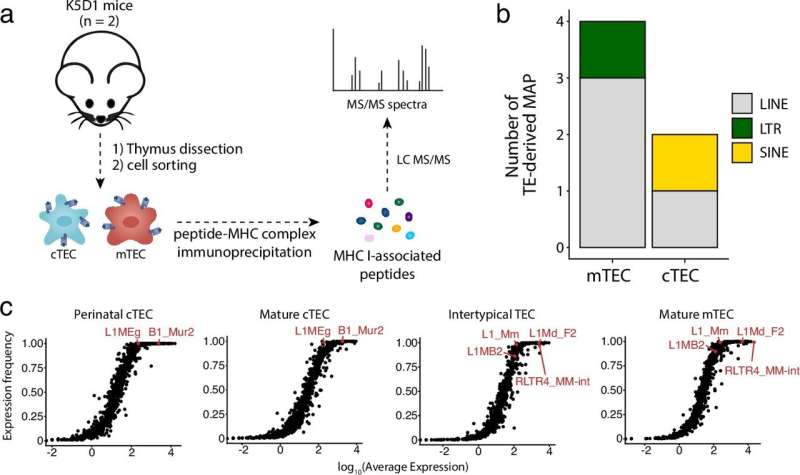This article has been reviewed according to Science X's editorial process and policies. Editors have highlighted the following attributes while ensuring the content's credibility:
fact-checked
peer-reviewed publication
trusted source
proofread
Do genetic 'parasites' help the immune system develop and function?

"Parasite" DNA sequences have three potential functions in the development of T (for thymus) lymphocytes, researchers led by Université de Montréal medical professor Claude Perreault show in a study published in the journal eLife.
The study, co-authored by doctoral student Jean-David Larouche, suggests that the expression of "transposable" elements in thymus cells is critical for preventing autoimmune reactions in vertebrates.
With this new knowledge, effective and safe immunotherapies targeting transposable elements, highly expressed in tumors, could be effectively developed, the researchers say.
Eliminating bad cells
T lymphocytes are immune cells involved in the elimination of infected and cancerous cells. They complete their development in the thymus, where they learn to tolerate the body's normal cells and detect invaders such as infectious agents or cancer cells.
DNA fragments dubbed "transposable" are expressed at higher levels in certain thymus cells than in the rest of the body. Referred to as genetic "parasites," they're remnants of viral infections that account for around 45% of the human genome.
The fact that their activity is high in the thymus raises an important question: are transposable elements involved in T-cell development?
To answer this question in their lab, Perreault's team carried out multi-omics analyses—a set of techniques enabling the analysis of several thousand indicators simultaneously and providing an overall perspective—in human and murine thymus cells.
Varies between cell types
The expression of transposable elements in the human thymus varies between cell types and during development. Two cell types express the elements particularly strongly—medulla thymus epithelial cells and plasmacytoid dendritic cells—and are essential for the establishment of self-tolerance in T lymphocytes.
The UdeM researchers identified three potential functions for transposable elements in the thymus:
- First, by binding numerous transcription factors, they contribute to various gene regulatory networks.
- Moreover, by stimulating the secretion of certain molecules, they induce a microenvironment that promotes the development of T lymphocytes.
- Finally, by presenting certain molecular fragments at their surface, they contribute to the education of T lymphocytes.
Transposable elements could therefore play several roles in the development and function of the immune system, according to Perreault, principal Investigator and director of the immunobiology research laboratory at the UdeM-affiliated Montreal Clinical Research Institute.
More information: Jean-David Larouche et al, Transposable elements regulate thymus development and function, eLife (2024). DOI: 10.7554/eLife.91037.3



















